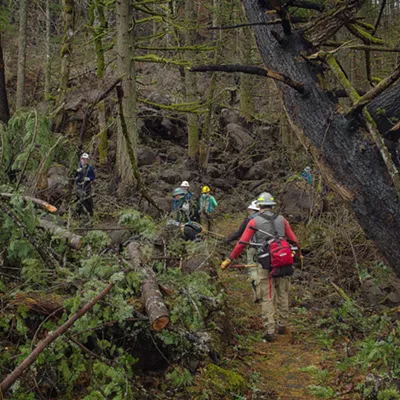Davis lumbers about the wooded landscape, observing Buckley's habitat. He worries that those juniper bushes lining Buckley's house will pose a fire hazard, and he wonders about the dry brush in his front yard. Though Davis never actually utters Smokey's well-known manifesto, by the end of the appointment it's resoundingly clear that "only you can prevent forest fires."
July, in its scorching glory, heightens Spokane's ever-present specter of forest fire. Davis hopes to extinguish the threat before sparks even begin to fly. His goal is to collaborate with homeowners like Buckley to surround their homes with "defensible space" -- a minimal 30-foot buffer area for reducing the risk of forest fire.
The Department of Natural Resources (DNR) and various fire departments conduct similar home assessments too. "We know that, in the state of Washington, 85 percent of all forest fires are caused by humans," says Mark Gray from the DNR.
And to make matters worse, says Davis, "We're setting up to have a really good fire season." (By "good," he means "bad.") Davis points to a rash of recent fires in Elk, Wash.; Coeur d'Alene; and Ford, Wash. Today's assessment is an important one, because it could save Buckley's life, his home -- his everything.
Buckley leads Davis through his property, his two huskies meandering by his side. The dogs seem wary of Davis. The Buckleys don't have many visitors here in north Spokane, and though Davis has come as an ally -- here to help, to save a life, maybe -- even Buckley seems to share his canines' skepticism.
Before long, Davis brandishes a Wildfire Hazard Severity form, an unsightly thing. It looks like those sheets of paper patients fill out at the doctor's office.
"The more points I record, the more risk," Davis says, delivering the statement in an undeniably clinical manner. And he begins operating. After a few minutes, Buckley grows comfortable with the procedure. It's free. Davis is there to offer advice.
"I just want an honest assessment," Buckley finally says.
Buckley is an older man, an employee of the U.S. Fish and Wildlife Service. He and his wife have made a cozy home here for four years, and he's proud of the garden, the view. He wants to protect his Eden from the sinister fires known to plague Spokane.
After a few minutes of examination, Davis stops in front of those dreaded juniper bushes. They line the pathway to Buckley's house, and Davis is concerned. "Just like gasoline on a flamin' stove," he says.
Buckley understands. They should probably go anyway. Moose eat them.
Davis continues his inspection, inquiring about the number of spigots on the house, the ease of access for a fire truck to enter Buckley's property.
"It's not gonna be a problem for them to get out here," Davis concludes. "I'm not gonna give you any points."
He inquires about Buckley's roof, about the foundation, about whether an adjacent shed is 30 feet from the house. In the end, it's an educational experience -- fun, even. The two men share jokes and talk about Buckley's job, the dogs -- Buckley even offers Davis a present, a pair of quail feathers.
The assessment is done. Buckley scores in the "high hazard" area. But a warm smile crosses his face, one of relief perhaps.
"Thank you very much, I appreciate it," Buckley says. "People want to live next to nature, but they don't realize it can bite you in the butt if you're not careful."
Davis and Buckley exchange a few more pleasantries before Davis hops into his pickup and rides off into the dusk.
Days later, Davis sits in his office having just returned from another home assessment. He's is encouraged by the positive response his department has received from nature-conscious homeowners. He reports he has already conducted nearly 40 inspections this season.
"A lot of people are even calling me out as they're building, which is nice," Davis says, explaining that doing so allows the homeowner to take precautionary measures before construction is complete. Davis says education and awareness are essential to preventing forest fires. Again, he points to the DNR and local fire departments as important fire-prevention resource centers. Because, to prevent forest fires -- especially this season -- Smokey will need all the help he can get.














